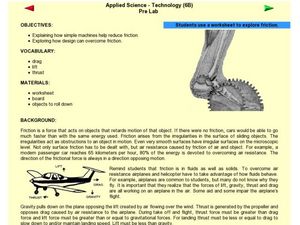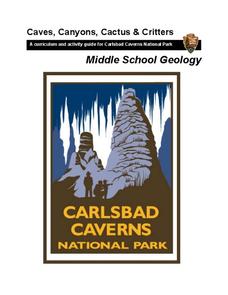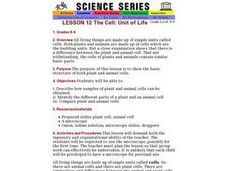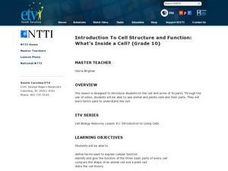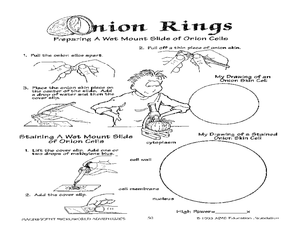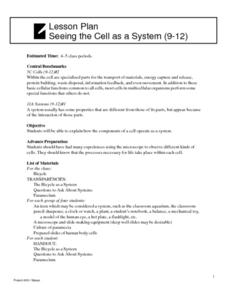Curated OER
The Science of Microbes
Learners will explore cells to understand that all living things are composed of cells. In this science lesson, students use the scientific process and work in cooperative groups to gain a better understanding of cells. In this...
Curated OER
Applied Science -Technology (6B) Pre Lab
Sixth graders discuss how simple machines overcome friction. In this simple machine lesson, 6th graders review the parts of a plane and how they make up for gravity and friction. They roll different objects down an inclined board...
Pennsylvania Department of Education
Animal Classes and Their Ecosystems
Students explore animal characteristics by participating in an environment identification activity. In this animal habitat lesson, students discuss a range of different wild life and the ecosystems that they are a part of. Students view...
Curated OER
Case Study Two: Shark Dissection
Young scholars read an article on sharks prior to beginning a dissection lab. As part of the lab, students identify differences between the shark anatomy and human anatomy and hypothesize why those differences exist.
Curated OER
Food Safety Unit Exam 1
Students complete seventeen question test about food safety which includes matching vocabulary terms, short answer questions and fill in the blank questions. Test is part of the Food Safety Unit produced by the College of Agricultural...
Polar Trec
Plankton Parents
Plankton are so abundant in the ocean they outweigh all of the animals in the sea. In this three day activity, groups discuss and become familiar with plankton, capture females, and look for egg production on day three.
Chicago Botanic Garden
Are All Plants Created Equal?
Photosynthesis requires energy and produces food, and cellular respiration produces energy and requires food. An interesting lesson analyzes the factors that affect the rates of photosynthesis and respiration. Classes spend one day...
Teach Engineering
Inside the DNA
Get your class to take a closer look at DNA. Pupils conduct research to determine the methods used by scientists to analyze the molecular structure of DNA. The class members investigate different types of molecular imaging along with gel...
National Park Service
Caves, Canyons, Cactus, and Critters
Mother Nature's Gravel Company is open for business! The unit includes four lessons covering weathering and erosion. Experiments are simple to complete and young geologists compare notes to see who makes the biggest ice wedge, moves...
National Nanotechnology Infrastructure Network
The Micro and Macro World Around Us
Don't let your eyes play tricks on you ... use scale to keep your eyes in check! Young scholars observe images without scale and try to identify the structure. Then, they look at the same image with a scale bar and assess whether their...
Curated OER
The Cell Theory
In this cells instructional activity, students review how the cell theory was developed. Students review the structure and function of cell structures and active transport. This instructional activity has 30 fill in the blank questions.
Curated OER
How Does Matter Look Up Close?
In this matter worksheet, students complete a graphic organizer by identifying tools that are used to magnify objects too small to see with just their eyes.
Curated OER
Cell Structure and Function
Tenth graders define and identify the cell membrane functions and structures. They study cell membrane properties" lipid bilayer" and explore cells under the microscope. They draw what they see, label any parts they can identify, and...
Curated OER
Dishing the Dirt Part 1
Students create a soil center on their school grounds. They begin to write in their science journals. They participate in an experiment that helps the community begin their own gardens.
Curated OER
The Cell: Unit of Life
Students identify the parts of plant and animal cells, how samples can be obtained and what the differences are.
Curated OER
Particulate Observation Lab
Learners collect samples of common dust from their homes and school for examination under a microscope. They identify the components of their samples using the provided "Atlas of Indoor Dust Particles." Pupils take samples form a variety...
Curated OER
Introduction To Cell Structure and Function: What's Inside a Cell?
Tenth graders are introduced to the cell and some of its parts. Through the use of video, 10th graders see animal and plants cells and their parts. They learn terms used to explain the cell.
Curated OER
Find the Speed of a Protist
Students identify protists under a microscope, and using a stopwatch calculate the speed of a protist from a pond water sample. They use distance and time to identify the speed of a protist, and create a distance versus time graph to...
Curated OER
Pond 2: Life in a Drop of Pond Water
Students observe organisms found in pond water with a microscope. In groups, they discuss how single-celled organisms satisfy their needs for food, water and air. They compare and contrast the needs of macroscopic and microscopic...
Curated OER
Onion Cells
Students observe the cells of an onion by wet mounting it and viewing it in a microscope. In this hands on lesson students make their own wet mount slide of an onion and are able to identify the cells in it such as, the nucleus,...
Curated OER
Seeing the Cell as a System
Students explain how the components of a cell operate as a system. Students examine a bicycle and find out if parts were arranged differently, could the system still be carried out. They look at cells as well and see what function they...
Curated OER
Plasmolysis in Elodea Plant Cells
Students microscopically observe various subcellular components. They determine the effects of different salt solutions on Elodea plant cells. Students explain the major function of a cell membrane and describe its structure.
Curated OER
Classification of an Echinoderm
High schoolers study starfish through dissection. In this biology lesson plan, students explore the lives of starfish as they view a slide show, observe parts of echinoderms, and compare the classification of the starfish with other...
Curated OER
A Limnology Study of Drainage Ditches
Students chemically test water, observe microscopic organisms in the classroom, and screen the sample for macroinvertebrates. They design a reporting sheet that list all the items to be tested and a space to record the results.
Other popular searches
- Microscope Parts
- Compound Microscope Parts
- Label Microscope Parts
- Microscope Parts Functions
- Identify Microscope Parts
- Biology Lab Microscope Parts
- Microscope Parts Lab
- Microscope Parts and Use
- Microscopes Parts
- Parts of the Microscope Pdf



